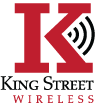
Categories:
Phone:
1-855-715-8745King Street Wireless
King Street Wireless (KSW) is a multi-state fixed wireless internet provider that offers residential service in 28 states, including California, Illinois, Iowa, Kansas, Maine, Maryland, Missouri, Nebraska, New Hampshire, North Carolina, Oklahoma, Oregon, Pennsylvania, Texas, Vermont, Virginia, Washington, West Virginia, and Wisconsin. King Street Wireless provides internet access and high-speed 4G LTE service in remote areas through a partnership with U.S. Cellular. The company is based in Alexandria, VA.
Fixed wireless internet service uses radio waves to send high-speed signals to and from consumer devices. It is a type of wireless broadband. It is faster than mobile broadband internet because fixed wireless has lower latency and higher bandwidth. Fixed wireless is also more reliable than mobile broadband because a fixed wireless base station is only shared by about a hundred users.
Fixed wireless is a rural internet option that connects one location, like a farm or a house, to the internet via radio waves. Fixed wireless is not Wi-Fi. Fixed wireless provides a direct point-to-point connection, requiring line-of-sight between the access point and reception device. Unlike Wi-Fi, fixed wireless cannot pass through or around minor barriers.
Fixed wireless is generally cheaper, faster, and more reliable than mobile wireless connections. The trade-off is that your connection is tied to a single location.
Fixed wireless requires line-of-sight access between the subscriber and a ground station. Obstructions like hills or trees can prevent it from being installed in some locations. Rain or fog can also affect the quality of the service.
As a prominent holder of 700 MHz wireless spectrum, KSW operates in various regions of the United States, including New England, the Mid-Atlantic, the Midwest, the South, and the Pacific Northwest. Their extensive coverage encompasses both urban and rural areas, with a particular focus on providing fixed wireless service. Working closely with equipment manufacturers, KSW ensures the creation of reliable systems nationwide, catering to the diverse needs of customers.
King Street Wireless Holds 172 licenses for 700 MHz spectrum across 27 states. The 700 MHz spectrum refers to a specific range of radio frequencies within the electromagnetic spectrum. It encompasses frequencies from 698 MHz to 806 MHz. This spectrum range is highly valuable for wireless communications because it can penetrate obstacles and cover large geographic areas.
The 700 MHz spectrum became available for commercial use as a result of the digital television transition in the United States. With the shift from analog to digital broadcasting, a portion of the spectrum previously used for television channels was repurposed for wireless services.
The 700 MHz spectrum is particularly advantageous for wireless communication networks because it generates signals better than higher-frequency bands. It can penetrate buildings and walls more effectively and has a longer range, making it suitable for providing coverage in both urban and rural areas.
Wireless carriers and telecommunications companies utilize the 700 MHz spectrum for various purposes, including deploying 4G LTE networks, expanding coverage, and enhancing network capacity. It is also utilized for public safety communications, as it provides reliable and wide-ranging connectivity for emergency services.
Overall, the 700 MHz spectrum plays a crucial role in enabling wireless communication services and supporting the growing demand for high-speed data transmission and connectivity.
LTE is a global standard for 4G wireless transmission data. LTE is the technology that enables 4G speeds. LTE is built for more speed and more bandwidth. LTE stands for Long Term Evolution because it took a long time for mobile networks to support 4G and now 5G. In the 1980s, 1G allowed us to talk on mobile phones. In the 1990s 2G allowed us to send texts on a cell phone and to roam outside of a certain area of provider coverage. In the 2000s 3G allowed internet access on a mobile phone. In the 2010s 4G technology enabled super-fast internet and in the 2020s 5G is supporting billions of new sensors on the Internet of Things. 5G is leading to many new inventions. 5G won’t replace 4G but instead will work with it.
The Internet of Things (IoT) refers to a concept where things like roads or medical devices become equipped with sensors and actuators. These objects are interconnected through wired and wireless networks, utilizing the same Internet Protocol (IP) that powers the internet. As a result, vast amounts of data are generated by these networks, which are then sent to servers for analysis. This ability for objects to measure their surroundings and communicate with one another allows for more information to be known about environments. These sensors are proliferating
Reach out to King Street Wireless to see if service is available in your zip code.
